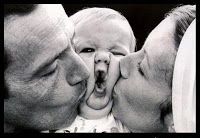Kiss on the cheek when greeting
I know that it is very common in spanish culture for people to kiss on the cheek when greeting each other. Does this ever transfer over to their non-spanish friends? Or would that not be acceptable. Por ejemplo, I noticed a situation at work where a guy approached two female coworkers. He kissed one girl, who was Columbian, on the cheek and said hello. He only said hello to the other female, even though he is much closer and more acquainted with her. Just wondering.
10 Answers
And what about those of us that wear a full beard and mustache? Some women don't like kissing a hirsute face? Will we have to be satisfied with a nod of greeting?
not me, but the style of beard and mustache

In Argentina we kiss all the time,, friends, co-workers, family and/or people we meet for the first time. It depends on the situation, of course, but it's very normal, even between men. In very formal situations people shake hands.
En Argentina damos besos todo el tiempo, entre amigos, compañeros de trabajo, familiares y/o gente que recién conocemos. Por supuesto depende de la situación, pero es muy normal, incluse entre hombres. En situaciones formales la gente se da la mano.
Spanish speakers know it is not our custom and it makes some people uncomfortable, but for some people it is fine. If someone from here goes to a country where this is common place. We will generally feel more comfortable with this custom. I remember the first time a Latin woman gave me a kiss on the cheek.. I was a little stunned and she quickly became embarrassed though I like this custom and many other Latin customs.
Many countries this is not actually a kiss on the cheek, it is beside. with a slight kiss sound though the lips do not actually touch the cheek.
The custom does transfer. In my church (which is a Hispanic congregation) it took a long while, but once I was 'accepted' I noticed that the women would greet me with a kiss on the cheek. At first I didn't know if I was supposed to reciprocate or not, but my experience has shown me that yes, reciprocation is expected ![]() Of course, this isn't true for every person, there are some that don't know me as well, and we only greet with a handshake. Now, the pastor and a few other men greet my wife with a kiss on the cheek, but at first it was simply a handshake. We have taken it to mean that we are 'part of the group' now, and it's a custom that my wife and I both cherish.
Of course, this isn't true for every person, there are some that don't know me as well, and we only greet with a handshake. Now, the pastor and a few other men greet my wife with a kiss on the cheek, but at first it was simply a handshake. We have taken it to mean that we are 'part of the group' now, and it's a custom that my wife and I both cherish.
In Ecuador it is very common to greet someone of the opposite sex with a kiss, but I wouldn't dare do that with my Chinese friends. The Spanish Taoist in Ecuador and Columbia only greet each other with an arm shake.
The most common greeting among friends is the "abrazo' for men and a brush of the cheek and a delicate hug for the girls. This will not be part of the greeting if you are the new member- you must be known to the group, once you are known you will be greeted in the traditional way in Mexico.
In my non Spanish area is is customary to greet those we know well with a hug while touching cheek to cheek and kiss the air. That sounds funny but it is true. They often repeat the cheek to cheek and air kiss on the opposite cheek as well. My older female relatives do actually touch the cheek with a kiss. Men never kiss while greeting one another and rarely hug. Handshakes are commom though. Often men will pat one another on the back as well. I do love the show of friendliness of everyone when I am travelling in Spanish speaking countries. We were surprised the first time though when a young, friendly girl lifted our little one to the air, twirled around several times with her, and kissed her face repeatedly, all the while smiling and laughing. Also, when our waiter asked our little one if he could give her a kiss, we were surprised as well. She said yes and he kissed her on the top of her head! That would never happen here. As I said, we do enjoy the friendliness in Spanish speaking countries and we always have a fantastic time..
El beso de saludo:
In Spain you must kiss everybody you're introduced to on both cheeks, whilst making loud smacking noises.. This applies to both sexes and particularly to children who are practically kissed to death.
It doesn't matter if you're introduced to the hairiest monster, kiss him you must.
When you see your new frinds next time you should rush up and kiss them again..
In France you kiss other women in a quieter, more stylish fashion, el beso al aire , and men less. You shake the hand of anybody who works for you, be they the doctor or the garage mechanic.
In England we nowadays kiss family and good friends on a regular basis and it's not uncommon do it on introduction, but only on one cheek. Glasses nowadays clash a lot during British introductions. This clashing of glasses is a worse problem than beards, in fact.
Brought up, as I was, in Scandinavia where you didn't kiss anybody except during sexual relations it has been a tough learning curve. I never kissed my great aunts or or even my grandmother. We shook hands, during my childhood!
A young girl would curtsey and a boy would bow his head a little during formal introductions.
How times have changed! Now , if I visit my mother I kiss her stiffly on her cheeks. My sisters and I never touch however, even though they are a much younger than I am.. We might, in an emotional crisis pat the other on the back, very lightly. In Spain I have been patted a lot on my back by people I hardly know, when I've had an upsetting experience and Ihave found that oddly touching.

When I lived in the UK (Scotland) for many years, it was customary to kiss a person on the cheek (or both cheeks) when greeting - depending on the person. If the person was introduced as a very good friend (or family of a close friend), you could choose to exchange cheek kisses, but you wouldn't just kiss someone who was interviewing you for a job. Now that we're living back in the US, the only people I would kiss on the cheek would be family. 
I am learning Spanish and I often see in the novelas where the locale being portrayed is a barrio in the United States and young Hispanic men greeting each other with something that sounds like "paway" (both a's being long sound. Sometimes they just say what sounds like "way". My brother teaches Hispanic students in a poor inner school and he has also told me he has heard this.
What are they saying and how is the word spelled in Spanish.
Muchas Gracias














